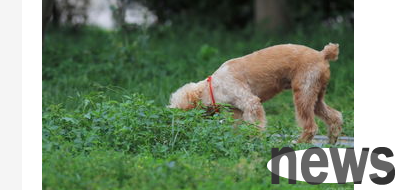People often see dogs rubbing their faces against walls, furniture, floors and other things. We don't worry too much, because dogs often like to do this, but we'd better also need to understand why dogs rub their faces.

Why do dogs rub their faces?
If a dog often rubs its face on something, then it may have problems. But if the friction is intermittent, you may not have to worry. Such as wet or dirty fur, pain from bad teeth or eye injury, irritation caused by fleas or allergies, or simply because of feeling good, these are potential reasons why dogs may rub their faces on something.
1. Allergies
Some dogs can develop allergies, causing them to itch and rub their faces. Skin inflammation can cause itchy skin or eyes, and dogs may rub their faces in an attempt to scratch them. Allergies may be foods or snacks that dogs eat or family and environmental allergens such as dust mites, various grasses or pollen. They can be constant or they can be just seasonal. Allergic dogs may have other symptoms, including itchy ears and/or odor, itchy paws and back ends, and other skin changes, including redness, hives and/or thickening of the skin.
2, fleas, mites and ticks
External parasites include fleas, mites (such as demodex and scabies), and ticks. All of these parasites can bite or drill into dog's skin, but not all cause itching. Fleas and scabies are usually the itchiest, and these pests can cause itch throughout the body, not just on the face. Conventional preventive medications should be used to prevent common skin parasites and any dog with extreme itching should be checked by a veterinarian.
3. Collar irritation
New collars or collars that are too tight may cause the dog to rub his face and neck against the ground, furniture, or walls to relieve discomfort. If a dog has a new collar, it should be checked to make sure it is not too tight or irritated to the dog's neck. Additionally, if the dog has not removed and cleaned the collar for a while and/or has grown or gained weight, it may now be too tight or needs adjustment or removal. You should be able to slide two fingers comfortably under the dog's collar.
4. Things on the face
Dogs with food, dirt and even water on the face may use them to wipe it off. This could be after a meal, after playing in the yard, bathing or swimming. If a dog is rubbing its face, there is no reason to worry for this reason, but the dog may need a little help to wipe its face off.

5, Pain
A bad tooth, other mouth pain, nose pain, or ear pain may cause the dog to rub his face on something to relieve pain. Dogs with toothache may eat less, want to eat soft foods, or chew on one side of their mouth. Bad breath, bloody saliva and food falling out of your mouth are other signs of tooth problems. 3 Loose, broken or ill teeth can cause pain and infection and need to be removed by a veterinarian. Ear pain can also cause dogs to rub their faces in an attempt to relieve their discomfort. Ear pain caused by infection is usually accompanied by bad smells and redness in the ears. If you suspect that the pain is the cause of your dog rubbing your face, you should have your veterinarian examine your dog immediately.
6. Brain tumors
Brain tumors are a rare reason why dogs rub their faces on something. Brain tumors can put stress on the brain and can feel pain or discomfort. Due to this discomfort, dogs with brain tumors may rub their heads, but brain tumors may be accompanied by many other symptoms without signs of pain or discomfort. Seizures, behavioral changes, and changes in vision or hearing may also be signs of brain tumors. If any of these symptoms are observed in your dog, it should be checked by a veterinarian.
7. Eye irritation
If a foreign object is stuck in the dog's eyes, if there are scratches or ulcers on the cornea, or if the dog's eyes are dry or allergic to the environment, it may cause itchy or painful eyes. These things can cause discomfort, causing the dog to rub his face and eyes. A dog with an eye irritated will also often scratch their eyes with its paws or close it. If you suspect an eye problem, your dog should immediately receive the attention of your veterinarian to reduce the irritation and prevent the problem from becoming more severe.
8. Smells good
Dogs have a very keen sense of smell, so if they like the smell of something, they may rub their entire face and body on it because they like it very much. The item may not have a pleasant smell for us, but for dogs it may be great. A common example of such an item is the dead animals found outside the yard. So if you find your dog rolling in a specific location in the yard, you should investigate and remove anything that may be a health hazard, such as wildlife feces or carcasses.
9. Low calcium levels
Low calcium or hypocalcemia can also cause facial itching and facial friction. Low calcium can occur for a variety of medical reasons and may include other signs such as convulsions, seizures, restlessness, aggressiveness and/or excessive drinking or urination. This condition must be diagnosed and monitored by the veterinarian, so any dog with these clinical symptoms should be tested immediately.